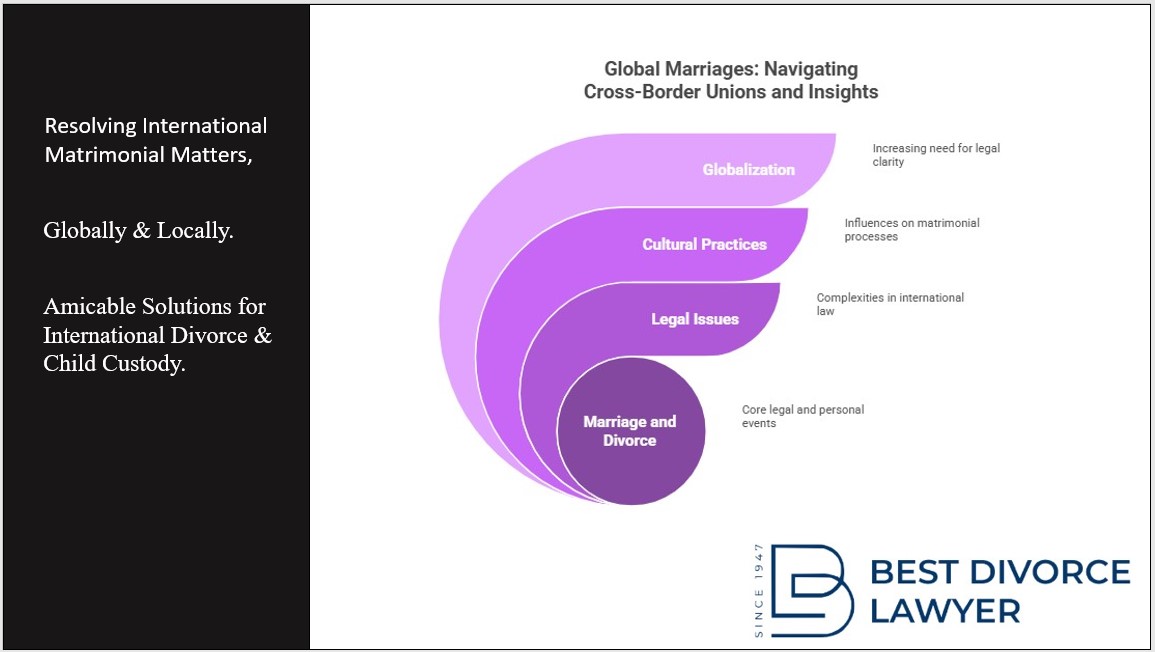Introduction
Globalization has profoundly transformed societal structures, creating a rich tapestry of cross-cultural connections. Among these, Global marriages have emerged as a distinctive hallmark of modern India. Cities like Jaipur, Delhi, Mumbai, and Gurugram, dynamic hubs of diversity and economic activity, are witnessing a significant surge in unions involving Non-Resident Indians (NRIs) or foreign nationals. While these marriages offer immense personal and cultural enrichment, they frequently come with a unique set of complex legal, cultural, and procedural challenges. In 2024, the evolving landscape of family dynamics saw India report over 2,500 international matrimonial cases, with Mumbai and Delhi at the forefront due to their highly cosmopolitan populations and robust international connectivity. This blog post aims to delve deeply into the multifaceted dynamics of global marriages, exploring the intricate legal frameworks that govern them, the nuanced cultural influences that shape them, and practical strategies couples can employ to navigate these unions successfully in urban India. For those seeking comprehensive legal insights and resources, platforms like Manupatra offer invaluable legal databases and case law references, making them essential tools for understanding the intricacies of Indian law.
Table of Contents

The Landscape of Global Marriages
Global marriages involve partners from different countries or legal jurisdictions. This often leads to unique challenges, especially concerning divorce, custody, or maintenance. For example, a couple married in Delhi, now residing in Canada, might face legal questions about applicable laws. These cases are intricate due to diverse legal systems and cultural expectations. The significant involvement of NRIs in matrimonial disputes in hubs like Gurugram underscores the need for clear guidance.
Legal Cornerstones for International Unions
India’s legal system addresses international matrimonial matters through several key statutes:
- Hindu Marriage Act, 1955: Governs Hindu marriages, including those of NRIs, covering aspects like divorce and maintenance.While a significant portion of its provisions are domestic, its applicability to NRIs often brings in cross-border considerations, especially concerning jurisdiction and the recognition of foreign divorces.
- Special Marriage Act, 1954: Facilitates inter-religious and international civil marriages, commonly used in diverse cities like Delhi. It provides a secular framework for marriage registration and divorce, making it particularly relevant for International matrimonial matters where one spouse may not be Hindu, Muslim, Christian, or Parsi.
- Foreign Marriage Act, 1969: Recognizes marriages solemnized abroad by Indian citizens, crucial for those married overseas. It is crucial for cases where Indian citizens marry in foreign countries and later return to India, or where disputes arise from such marriages.
- Code of Civil Procedure, 1908 (Section 13): Dictates the recognition of foreign judgments in India, a common point of contention in courts. However, challenges often arise, necessitating expert legal counsel to ensure proper recognition.
Cultural Nuances in Cross-Border Unions
Cultural differences profoundly shape international marriages. Traditional values in areas like Jaipur might clash with Western individualism, impacting marital expectations. In Mumbai, romanticized notions from popular culture can differ from the legal realities of international disputes. Successful global marriages often require couples to bridge these gaps through open communication and mutual respect, sometimes aided by cultural sensitivity training.
Overcoming Key Challenges
International marriages present distinct challenges that require careful attention:
- Jurisdictional Disputes: Determining which country’s courts have the authority to hear a case can be complex, leading to potential conflicts.
- Cultural Misunderstandings: Divergent views on family roles or financial responsibilities can strain relationships.
- Enforcement Hurdles: Enforcing Indian court orders abroad, like maintenance payments, faces hurdles due to limited international reciprocal agreements.
- Child Welfare: Cross-border child custody disputes are a growing concern, often involving complex international principles.
Strategies for Harmonious Global Marriages
To foster success in international unions, several proactive strategies are beneficial:
- Pre-Marital Agreements: Clear agreements on property and responsibilities can help prevent future conflicts.
- Cultural Dialogue: Couples benefit from understanding each other’s backgrounds, often through dedicated counselling or workshops.
- Mediation: This service offers an amicable and cost-effective way to resolve disputes, with a high success rate in international cases.
- Legal Consultation: Early engagement with a lawyer familiar with international matrimonial matters ensures compliance and proactive problem-solving.
The Role of Consular Services in International Marriages
Consular services provided by embassies and consulates play a significant, often overlooked, role in international matrimonial matters. Beyond marriage registration, they offer crucial assistance to distressed Indian nationals abroad, including guidance on local divorce laws, emergency travel documents for children in custody disputes, and even legal aid referrals. Their support can be invaluable for NRIs facing marital challenges overseas, acting as a vital link back to their home country’s legal and welfare systems.
The Role of Indian Family Courts
Family courts in cities such as Delhi, Mumbai, Jaipur, and Gurugram are equipped to handle global marriage disputes. They apply Indian laws while also considering foreign judgments and international principles. These courts often prioritize mediation and counselling to encourage amicable settlements. They also focus on the “welfare of the child” in custody cases, increasingly applying global best practices. These courts strive for efficient resolution, leveraging technology for convenience.
FAQs
- What defines a global marriage? A marriage between partners from different countries or jurisdictions.
- Which Indian laws apply? Primarily the Hindu Marriage Act, Special Marriage Act, and Foreign Marriage Act.
- How are cultural clashes managed? Through open dialogue, counselling, and cultural sensitivity.
- What is mediation’s role? It offers an amicable, cost-effective way to resolve disputes.
Conclusion
Global marriages in India’s urban centers blend unique personal connections with intricate legal and cultural realities. Navigating these unions successfully hinges on understanding the legal landscape, embracing cultural differences, and seeking expert guidance when needed. Proactive planning, effective communication, and the strategic use of legal and counselling support are crucial for building resilient cross-border relationships. They are equipped to provide strategic advice, represent clients effectively in court, and work towards outcomes that protect their interests and offer stability.
For legal assistance, call +91 9461620006 or visit www.bestdivorcelawyer.in today!


